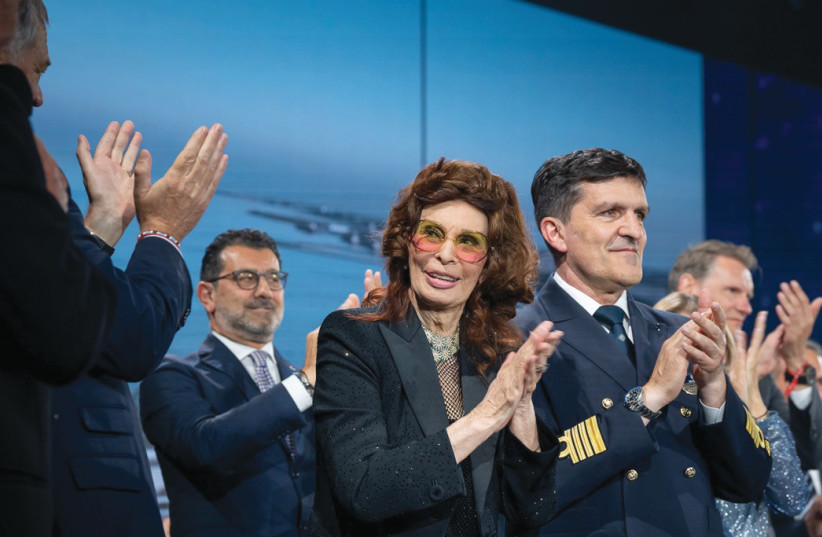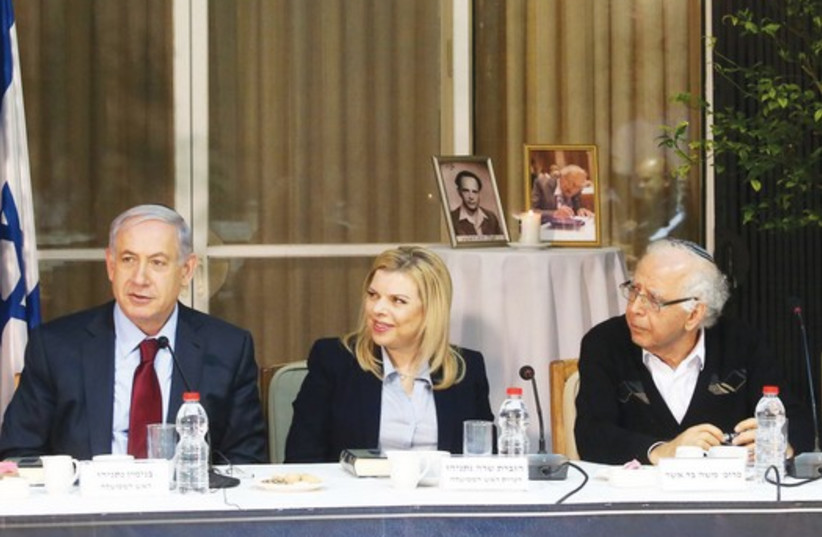Women’s organizations and organizations of people with physical disabilities should get together to honor Knesset Member Karine Elharrar, who has overcome gender and disability obstacles to become a lawyer, a politician and a minister, and who has traveled abroad representing Israel. She is a multiple success symbol and a source of inspiration to talented individuals who do not want to be held back because of their gender or physical disability. Elharrar is proof that when people are judged on what they can do rather than what they can’t, they can go a very long way.
■ WHEN YOU’RE in the tourism and travel business, you not only get to see the world but also to meet famous people. Some people’s experience may be confined to a particular city or country, but there are others such as Eyal Atias, CEO of the Israel branch of Swiss headquartered MSC Cruises that operate worldwide, who in his various capacities has definitely “been there and done that.” Atias was previously CEO at Caspi Aviation and before that vice president of Egged Tours and Recreation. Collectively, all these roles gave him considerable travel experience in Israel and abroad. He has met many famous people over the years.
He met actress Sophia Loren when he went to Copenhagen earlier this month to join fellow MSC Cruise executives from around the world at the naming ceremony and launch of the company’s first cruise ship with zero greenhouse gas emissions. The new ship, named Euriba is the 22nd in the company’s cruise fleet, and the first in the cruise industry to be powered by liquefied natural gas. The godmother of the MSC cruise fleet Loren, who at 88 is still beautiful and alluring, was naturally present at the launch.
The use of LNG ensures environmental efficiency and compliance with international sustainability standards in the fight against climate change, said Pierfrancesco Vago, chairman of the Cruise Department at the MSC Group.
MSC is the third-largest global cruise brand and is part of a shipping and logistics conglomerate with a maritime legacy that spans more than 300 years and a workforce of over 30,000 employees.

Award season in higher education and cultural institutions
■ MAY, JUNE and July are the main periods in which Israel’s higher education and cultural institutions award honorary doctorates, fellowships and prestigious prizes such as the Dan David Prize and the Wolf Prize.
Although there are Israelis among the recipients, the overwhelming majority are academic researchers and philanthropists from abroad. Events honoring these people are publicized in large advertisements in various Israeli media outlets, but they receive minimal editorial attention unless a head of state or government or some other very famous person is among the honorees.
Yet all these institutions do no less than the president, prime minister, foreign minister and defense minister in fostering bilateral and multilateral relations with Israel.
Boards of governors, visiting professors and foreign students are all, in a sense, ambassadors for Israel in their home countries but simply do not receive the media attention they deserve. For that matter, nor do most of the Israelis who are honored by these institutions.
A case in point is Rabbi Benny Lau, who was one of two Israelis among a dozen honorees at the Hebrew University last week. The other 11 all received honorary doctorates, whereas Lau, who has dedicated his life to making Jewish learning more accessible to the wider Israeli public received the Samuel Rothberg Prize for Jewish Education. Without in any way denigrating this prize, surely under the circumstances, it would have been appropriate to confer an honorary doctorate on Lau as well.
One of his most important contributions to the accessibility of studies in Judaism is 929, which in Hebrew is called Tanach B’Yachad, meaning “Bible study together.” Under the auspices of 929, which was launched at the President’s Residence during the presidency of Reuven Rivlin, groups of people from different walks of life and social strata come together to study the Bible. It might be the Torah portion of the week, or a particular verse or issue, but they are together, asking questions and voicing opinions.
Currently, 929 continues on a monthly basis at the President’s Residence, thereby setting an example for the nation. The Bible, after all, is the most important history and law book of the Jewish People and it is fitting that its study is actively encouraged by the head of state. Prime Minister Benjamin Netanyahu, like President Herzog, is the grandson of a rabbi, but far less observant than Herzog. But he is also known to be a keen student of the Bible, regardless of his secular lifestyle.

Lau retired from being a community rabbi after 18 years as the spiritual leader of the Ramban congregation in Jerusalem but continues to be an outspoken advocate for the modernization of the Chief Rabbinate, for human rights and social justice within Judaism, recognition of women as religious scholars and spiritual leaders; and kinder treatment accorded to people undergoing conversion or who have been converted abroad. He is a frequent lecturer, broadcasts regularly on radio and contributes to print media. Surely all this and more make him deserving of an honorary doctorate.
■ IN A touching tribute to their late daughter Gilat, who suffered a rare disease and passed away at the age of 11 in 2008, Jerusalem residents Tali and Yair Eisenmann last week donated more than 1,300 dolls to United Hatzalah. These dolls, resembling Gilat, who died in her native Holland, will be utilized by United Hatzalah volunteers to provide solace to young children and their families during medical emergencies across the country.
Motivated by their profound loss and their desire to honor their daughter’s memory, the Eisenmann established the Gilat Foundation in 2009. The foundation offers interactive children’s theater in Holland’s hospitals, bringing joy and light to young patients who spend a significant portion of their lives confined to medical facilities – much like Gilat.
The Eisenmann family moved to Israel in 2020 and recently extended their commitment to supporting children’s well-being by donating a collection of dolls to United Hatzalah. The dolls wear United Hatzalah vests with Gilat’s name and will be used by volunteers to provide comfort and support to young children when treating them or their relatives. Gilat’s mother Tali recently completed the organization’s EMT course and now volunteers as a first responder.
In addition, the Eisenmanns contributed more than 40 “smart” child and infant CPR manikins, which can connect to a phone app to monitor the effectiveness of chest compressions, thus providing more advanced CPR training for United Hatzalah EMTs.
In expressing appreciation to the Eisennmann family for their generous donation, Hadas Rucham, head of training at United Hatzalah’s Pediatric Clinical Research Unit, explained that among children, traumatic events are intensified by feelings of helplessness, the inability to comprehend what is happening, and the lost sense of security. In emphasizing the significance of the Gilat dolls, she said: “A doll serves as a bridging, projective tool that allows us, as first responders, to quickly establish a sense of kinship and trust in the field. Through these dolls, children can express their inner world, which aids in their coping with the traumatic experience.”
Equal opportunities for all citizens
■ PITCHON LEV is one of several Israeli NGOs dedicated to fostering equal opportunity for all the residents of Israel and invests some of its resources in narrowing the educational gap between Arab and Jewish youth and providing leadership training to empower minorities and young people living in peripheral areas. It also provides food parcels for the needy.
The Taipei Economic and Cultural Office in Tel Aviv – currently headed by Ya-Ping (Abby) Lee – and the Diplomatic Spouses and Partners of Israel Club headed by Eden Goldberger joined forces last week to celebrate 30 years of friendship between Israel and Taiwan, and to simultaneously raise funds for Pitchon Lev. The event included a pre-public opening of an exhibition of works by Taiwan’s Amis artist Yosifu Kacaw as well as a public auction of paintings by well-known Israeli artist Sali Ariel. All proceeds from the event were donated to Pitchon-Lev whose CEO Eli Cohen outlined the organization’s extensive activities, whose primary aim is taking impoverished families out of the cycle of poverty.
In addition to the fiscal donation presented to Cohen, Yosifu Kacaw donated a special work of art to Pitchon-Lev in honor of its humanitarian work.
The Taipei Economic and Cultural Office in Tel- Aviv maintains an ongoing collaboration with Pitchon-Lev, supporting one of its programs: Program 7, a long-term educational and empowerment program designed to provide young people from challenging backgrounds with the tools and skills to cope and lead successful adult lives.

■ TWO SEPTUGENARIANS rapidly approaching their 80th birthdays, and a third aged 71, will be competing in the upcoming municipal elections. Tel Aviv Mayor Ron Huldai, 78, is going for his last hurrah; while Yona Yahav, 79, a former mayor of Haifa who was ousted by incumbent Einat Kalisch Rotem, is aiming for a comeback. Miriam Feirberg Ikar, the youngest of the trio at 71, has served five terms as mayor of Netanya – and is going for her sixth. Politically, she is affiliated with Likud. Huldai has also served five terms. Politically, he is on the Center-Left and until 2020 was affiliated with the Labor Party. Yahav, also a former Labor MK, served three consecutive terms and continues to have a large following.
Meanwhile, it’s not certain that Haim Bibas, the mayor of Modiin and the head of the Federation of Local Authorities, will retain his power base. Bibas, who until last week was head of the Likud Municipal Committee, was ousted by Netanyahu, and replaced by Bat Yam Mayor Tzvika Brot, who was elected by the Likud Central Committee on Netanyahu’s recommendation. Bibas sparked Netanyahu’s ire by daring to be publicly critical of him.
greerfc@gmail.com
